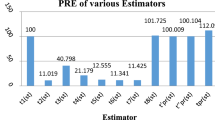Abstract
In this paper, classes of separate and combined regression-cum-ratio estimators have been proposed for estimating the finite population mean in stratified random sampling. The expressions for biases and mean square errors (MSEs) of the proposed classes have been derived to the first order of approximation. It has also been verified that the proposed classes of estimators, at their optimum conditions, are equivalent to the separate regression estimator. The proposed classes of estimators have been compared with the other existing estimators using MSE criterion, and the conditions under which the proposed classes perform better have been obtained. Numerical illustrations are given in support of theoretical findings. Relevance of the work The estimation theory is relevant to various interdisciplinary areas of research including economics, clinical trials, population studies, engineering, agriculture, etc. Also, the problem of estimation of mean is of huge importance in research, for instance, the estimation of: average agricultural production, average life span of persons in a region, mean concentration of dissolved minerals in water, and much more. For the estimation of mean, several design-based approaches are being widely used, for instance, simple random sampling, stratified random sampling, two-phase sampling, etc. If the population under study is homogeneous, then the simple random sampling design is used at the estimation stage. However, in various practical situations, the research study is based on the heterogeneous population, and in that case the stratified random sampling procedure is preferable over the simple random sampling. Considering the above fact, an attempt has been made in this paper to develop the classes of generalized estimators for the mean of the variable under study using stratified random sampling.
Similar content being viewed by others
References
Thompson SK (2012) Sampling, 3rd edn. Wiley, New Jersey
Upadhyaya LN, Singh HP (1999) Use of transformed auxiliary variable in estimating the finite population mean. Biom J 41:627–636
Kadilar C, Cingi H (2003) Ratio estimators in stratified random sampling. Biom J 45(2):218–225
Shabbir J, Gupta S (2006) A new estimator of population mean in stratified sampling. Commun Stat Theory Methods 35:1201–1209
Shabbir J, Gupta S (2011) On estimating finite population mean in simple and stratified random sampling. Commun Stat Theory Methods 40:199–212
Singh HP, Vishwakarma GK (2005) Combined ratio-product estimator of finite population mean in stratified sampling. Metodol Encuestas 7:43–53
Singh HP, Vishwakarma GK (2008) A family of estimators of population mean using auxiliary information in stratified sampling. Commun Stat Theory Methods 37(7):1038–1050
Singh HP, Vishwakarma GK (2010) A general procedure for estimating the population mean in stratified sampling using auxiliary information. Metron LXVIII(1):47–65
Singh HP, Tailor R, Singh S, Kim JM (2008) A modified estimator of population mean using power transformation. Stat Pap 49:37–58
Koyuncu N, Kadilar C (2010) On improvement in estimating population mean in stratified random sampling. J Appl Stat 37(6):999–1013
Vishwakarma GK, Singh HP (2011) Separate ratio-product estimator for estimating population mean using auxiliary information. J Stat Theory Appl 10(4):653–664
Tailor R, Sharma B, Kim JM (2011) A generalized ratio-cum-product estimator of finite population mean in stratified random sampling. Commun Korean Stat Soc 18(1):111–118
Vishwakarma GK, Kumar M (2016) Efficient classes of ratio-cum-product estimators of population mean in stratified random sampling. Probab Math Stat 36(2):267–278
Kumar M, Vishwakarma GK (2017) A generalized class of regression-cum-ratio estimators of population mean in simple random sampling. Int J Math Stat 18(1):87–95
Singh S (2003) Advanced sampling theory with applications. Kluwer Academic Publishers, Dordrecht
Kadilar C, Cingi H (2005) A new ratio estimator in stratified random sampling. Commun Stat Theory Methods 34:597–602
Murthy MN (1967) Sampling theory and methods. Statistical Publishing Society, Kolkata
Author information
Authors and Affiliations
Corresponding author
Additional information
Publisher's Note
Springer Nature remains neutral with regard to jurisdictional claims in published maps and institutional affiliations.
Rights and permissions
About this article
Cite this article
Kumar, M., Vishwakarma, G.K. Generalized Classes of Regression-Cum-Ratio Estimators of Population Mean in Stratified Random Sampling. Proc. Natl. Acad. Sci., India, Sect. A Phys. Sci. 90, 933–939 (2020). https://doi.org/10.1007/s40010-019-00628-1
Received:
Revised:
Accepted:
Published:
Issue Date:
DOI: https://doi.org/10.1007/s40010-019-00628-1



